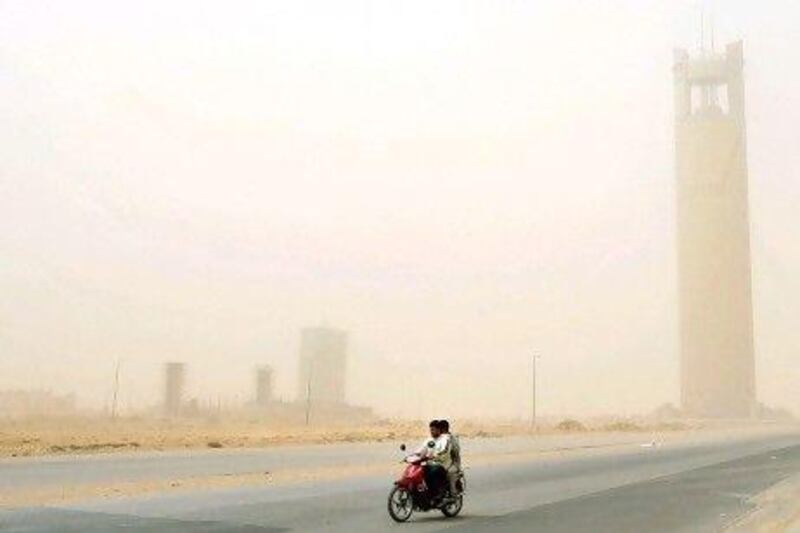DUBAI // A powerful sandstorm blowing over the Gulf disrupted air traffic in Yemen, and closed schools and sent hundreds of people to hospital with respiratory problems in Saudi Arabia.
In the UAE, commuters complained of poor visibility, doctors warned residents with respiratory diseases to stay indoors and police warned drivers to use extra caution.
"There is dust and haziness due to massive dust winds coming in from Pakistan and Iran. There is low pressure over Pakistan and the sands of Iran are causing the dust to blow into the country, especially over the east and north.
"The dust yesterday came in from Iraq and Saudi Arabia," said a forecaster at the National Centre of Meteorology and Seismology in Abu Dhabi.
Conditions at sea will be rough and fishermen were warned to stay clear of the water, the forecaster said.
Strong winds are expected to continue to churn up dust and reduce visibility in the Emirates today and temperatures are expected to drop.
The Saudi ministry of education yesterday announced the closure of schools in the north, east and south-west of the kingdom because of the storms, a day after similar measures were taken in the capital, Riyadh, the official SPA news agency reported.
In Riyadh, hundreds of people, mostly children with asthma or allergies, were treated for breathing difficulties triggered by the storm, according to official statistics released late on Saturday.
In Yemen, the sandstorm disrupted air traffic in and out of Sanaa's international airport. At least two flights were cancelled yesterday while several others were delayed or re-routed to the southern city of Aden, the official Saba news agency reported.
For the Dubai-based site manager Shahroz Ismail, recurring dust storms have made travelling to Fujairah twice a week tough.
"You can't see clearly through the sand and my eyes get tired quickly because I must concentrate more," Mr Ismail said. "I hope the worst is behind us."
In the Jebel Ali area, visibility was down to 700 metres, and to 1,200 metres in Abu Dhabi.
The weather centre cautioned motorists to prepare for sudden weather changes. The temperature has fallen from 38°C on Saturday to 17°C yesterday. In interior areas, the temperature could fall to 13°C, and even to 9°C in the mountains.
"This instability is because of the transition between winter and summer," the forecaster said.
By tomorrow, the winds could drop, causing humidity to rise with chances of mist or fog, but strong winds would persist in Fujairah and Ras Al Khaimah.
Dr Anwar Sallam, the deputy chief medical officer at Abu Dhabi's Al Mafraq Hospital, said patient intake in the emergency room for respiratory problems increases by nearly a third during sandstorms.
He said the greater threat was to those with underlying respiratory problems, such as asthma or chronic obstructive airway disease.
"These patients will come in with severe bouts of cough, breathing difficulties and bronchial spasms," he said.
What makes this year different, Dr Sallam said, is the frequency of such conditions.
"Before we would only see it for a couple of days in a year," he said. "Now it's the third week with the same story. The weather changes are a lot more prominent and this is what people are not used to."
Dr Joseph Manna, the chairman of the emergency department at Al Ain Hospital, said that patient intake for breathing and eye problems doubles or triples at his hospital during sandstorms.
"Today is not as bad as it was previously. During a stronger sandstorm two weeks ago, we received three asthmatic patients complaining of severe respiratory problems, and these were only the adults," he said. "We also received three eye complaints within a few hours. This is unusual during such a short span of time."
Dr Manna advised residents with respiratory diseases to stay indoors, and all those who must go outside to cover their mouths with a scarf or piece of cloth. He also advised residents to wear some form of eye protection. "You don't have to go the extent of wearing safety goggles, but sunglasses would help."
mismail@thenational.ae
* With additional reporting by Agence France-Presse






